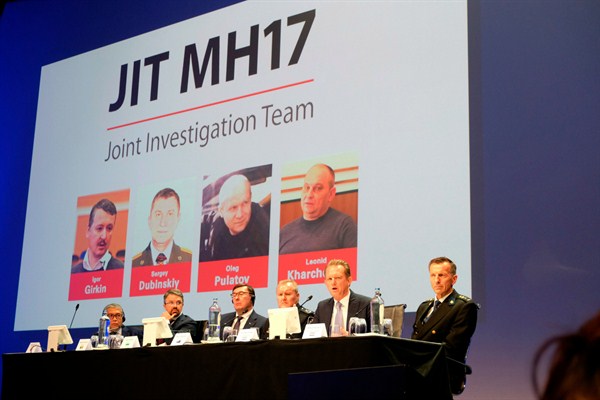This week marks five years since Malaysia Airlines Flight 17 was shot down over eastern Ukraine. Since then Russia has seemingly spared no effort or expense in waging an epic disinformation campaign to beat back allegations that Kremlin-backed mercenaries and separatists in the Donbas region fired the Russian-made Buk missile that killed all 298 people on board the passenger jet. Yet as evidence of Russian involvement has continued to mount in recent days, it looks like Moscow may need to retool its strategy.
Almost five years to the day that a group of intrepid journalists at Bellingcat, an investigative collective, began connecting the digital dots between the shootdown of Flight 17 and a Russian-backed private paramilitary contingent known as the Wagner Group, Ukrainian authorities made their first arrest in the case. Early this month, Ukraine’s SBU security service quietly nabbed Volodymyr Tsemakh in the rebel town of Snizhe after video of Tsemakh surfaced in which he apparently acknowledged that while he was commander of air defense for the separatist 1st Slavyansk Brigade, he received orders from leaders of the Wagner Group and the much-feared Vostok Battalion to hide the plane’s black box flight recorder.
While President Vladimir Putin still vigorously denies charges that members of Russia’s GRU intelligence service commanded the separatists who shot down MH17, more recent reporting from Bellingcat on Tsemakh suggests the Kremlin’s party line won’t hold up to closer scrutiny for much longer. News of Tsemakh’s arrest came only two weeks after Dutch prosecutors in The Hague announced that they had filed formal murder charges against three Russians with military or intelligence backgrounds—Igor Girkin, Sergei Dubinsky and Oleg Pulatov—and a Ukrainian national, Leonid Kharchenko, for their alleged role in downing the jet. The same day, Bellingcat published yet another update on the MH17 case, revealing more details about the role of separatists and Russian mercenaries in transporting the Buk missile launcher. With the trial of the accused MH17 co-conspirators now set to begin in March 2020, it seems all but certain that more details will be revealed than the Kremlin would like about the Wagner Group.

